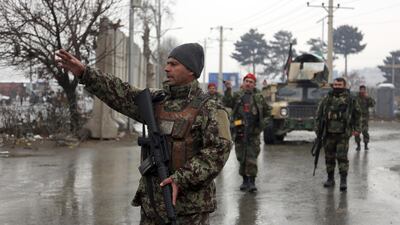The people of Kabul didn’t even have 48 hours to grieve. An ISIL attack on an army base in the city yesterday killed at least 11 soldiers and wounded more than 15, concluding a bloody fortnight in the capital. It came two days after the deadliest bombing for months in Kabul – and the most sickening, given the circumstances – and just days after militants stormed the luxurious Intercontinental Hotel and the offices of Save the Children, leaving death and destruction in their wake. At the centre of a protracted conflict, the people of Kabul have witnessed unremitting aggression. Yet the recent cycle of violence demonstrates the culture of impunity that has gripped Afghanistan. The regularity of this month’s attacks is particularly alarming. Contrary to official lines about recent victories against militants in the country, the Taliban, ISIL and the Al Qaeda-affiliated Haqqani network are all vying for relevance, trumping each other’s viciousness. That would be a challenge to any stable government, let alone one as precarious at the one sitting in Kabul, beleagured by internal bickering, an incoherent strategy from the US and an ongoing battle against corruption.
President Ashraf Ghani – an accomplished academic and intellectual – has so far been unimpressive in the nitty gritty of Afghan politics, an environment to which he is ill-suited. “This is the worst job on Earth,” he told the BBC in an interview last October. With Mr Ghani’s government under attack, his country has been plunged deeper into chaos.
This month’s attacks have hit the country’s already ailing security apparatus. Among the Afghan military, morale is low and desertion rates are high. Some units, it is alleged, have even been infiltrated by militants.
Meanwhile, sowing turmoil is the Taliban’s chief priority. More than 16 years into what began as a bruising battle for territory, what is now at stake in the Afghan war is Mr Ghani’s rule. And while one side seeks to govern, the other seeks only to disrupt. Pushed underground by US airstrikes, the Taliban has reverted to guerrilla warfare in partnership with the Haqqani network. Having been routed in Syria and Iraq, ISIL has done the same. Tragically, civilian targets are back on the table. Only a few months ago Mr Ghani favoured a peace deal with the Taliban. Give the butchery of this month – including Saturday’s bomb detonated 200 short yards from the High Peace Council, established in 2010 to negotiate with the militants – talks now seem fanciful. And with neighbouring Pakistan dragging its feet and the US State Department chronically understaffed, who would broker the deal? For now, all parties are marching on, stubbornly lurching from one disaster to the next, sacrificing in the process the lives and prospects of the Afghan people.

